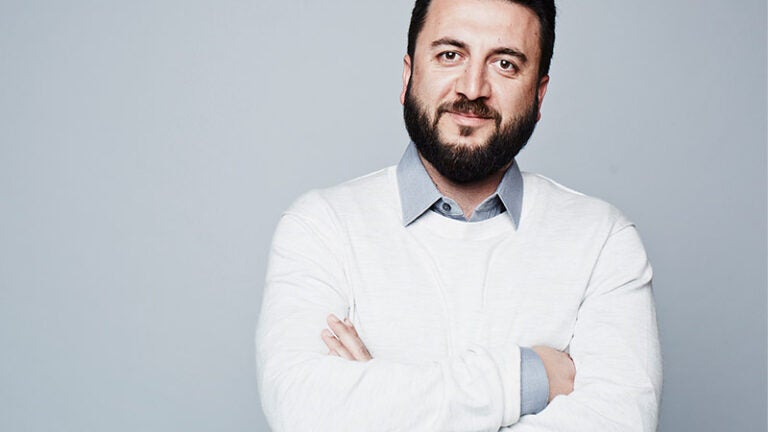
Alumnus’ billion-dollar software company for the trade industries is inspired by his blue-collar dad
Highlights:
- Vahe Kuzoyan grew up wanting to pay back his parents for the sacrifices they made in immigrating to America from Armenia.
- A summer spent building software for his dad, a plumber, led to the founding of a software company with more than 1,600 employees.
- His degrees in neuroscience and computer science from USC first put him on the path to success.
After graduating in 2006, Vahe Kuzoyan had no plans to stay in Los Angeles. He was gunning for a job at a prestigious tech company, up north in Silicon Valley. First, though, he agreed to help his father, Arutyun Kuzoyan, set up new software for his plumbing business.
“The software that my dad was using was just awful. It was a blinking green screen, with no mouse,” explains Vahe Kuzoyan, who graduated from USC Dornsife College of Letters, Arts and Sciences with a degree in neuroscience. He figured he’d spend a few weeks finding an alternative, install it and then be on his way. After researching the available options, however, Kuzoyan couldn’t find anything he felt good about recommending to his dad.
He reached out to Ara Mahdessian, a recent management science and computer science graduate from Stanford University whose father was a contractor. The two had met while on a ski trip hosted by the USC Armenian Student Association. If they put their heads together, Kuzoyan thought, they could whip up some improved software for both their dads’ businesses before the summer ended.
The project soon took on a life of its own. The duo grew their summer venture into ServiceTitan, an all-in-one software platform for businesses in the trade industries, such as plumbing and electrical, to manage customer service, technician dispatching, payroll, marketing and more. A little more than a decade later, the company is valued at around $10 billion and is headquartered in Glendale, California, not far from the plumbing shop that originally sparked the idea.
Pursing the American dream
Kuzoyan immigrated with his family from Armenia to California when he was 6. His parents, who spoke no English and had no formal education, settled the family in Glendale, home to the largest community of Armenians outside of Armenia. Kuzoyan’s father learned the plumbing trade and set up a small business to support his wife and children.
“My parents went through a lot to provide my brother and I with opportunities for a better life. I took that very seriously,” says Kuzoyan. “There’s almost a debt that had to be repaid. That raised the bar significantly on my level of ambition.”
Kuzoyan’s first planned step for success was attending an elite university. He applied to several but to his initial disappointment received his only letter of acceptance from USC. Kuzoyan arrived on campus for the spring semester and soon realized that USC was home.
“When I got there, I really felt like it was the right school for me. The energy, the entrepreneurial spirit, the Trojan network,” says Kuzoyan. “It took me five years to graduate, and it was intentional. I just wanted to stay at USC for as long as possible. USC definitely saw something in me that the other schools didn’t.”
Knowledge that serves
He started first as a business major at the USC Marshall School of Business, then switched to a double major in neuroscience and computer science at the USC Viterbi School of Engineering. For tech enthusiast Kuzoyan, neuroscience was a way to study the ultimate, biological computer — the human brain.
The neuroscience department helped Kuzoyan carve a unique path for himself, one that combined traditional coursework with Kuzoyan’s interest in technology.
“They worked with me to custom tailor which classes I took in order to qualify for my degree,” says Kuzoyan. “The fact that I had a person sitting down, talking with me and figuring out a path that was the best thing for me was incredibly impactful.”
Lessons from his USC Dornsife classes still resonate with him more than a decade after graduation.
“I still use what I learned in my Psychology 101 all the time,” he says. “For instance, we all think that we’re rational actors, but what really drives behavior is the emotional system. That little factoid has been maybe the most powerful bit of knowledge I took away from USC, in terms of building a business.”
Kuzoyan also found a relationship that’s endured all these years later: He met his wife, Ruzan Antossyan ’07, a political science major, through the USC Armenian Student Association.
Business essentials
The COVID-19 pandemic made the last few years a challenging time for business owners, but Kuzoyan says the pandemic has also revealed how extremely essential his customers’ skills are.
“It turns out that plumbing is essential, air conditioning is essential. … This is an incredibly important and incredibly lucrative industry,” he says.
Kuzoyan believes that the trades are ripe for tech disruption. Market segments like food delivery or the health industry are already saturated with start-ups, but there’s less competition in catering to blue-collar businesses.
“The areas that are going to have the biggest opportunity are the ones that aren’t obvious, that are overlooked by the masses. The wrong way to go about building a business is to look at what happens to be trendy,” says Kuzoyan, who now advises and invests in tech start-ups, along with overseeing ServiceTitan’s nearly 2,000 employees.
Kuzoyan’s work ethic is clearly hereditary. When asked if his father has retired thanks to ServiceTitan’s success, Kuzoyan laughs.
“He’s probably working underneath a house as we speak,” he says.